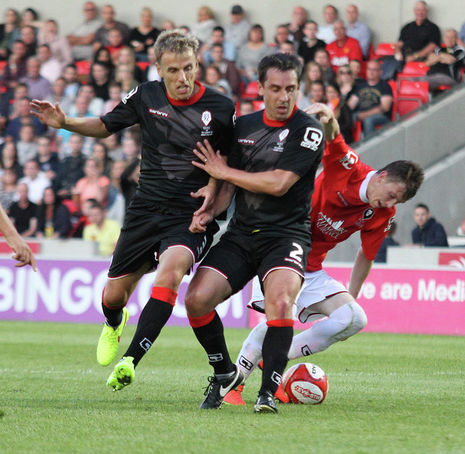The rise and fall Of Phil Neville
With the news that Phil Neville will leave his role as England Women’s head coach at the end of his contract in July 2021, Thomas Breakwell argues that it is clear that Neville’s tenure will be regarded as a noble experiment that went wrong.

The appointment of Phil Neville as head coach of the England Women’s football team in January 2018 was greeted with a mixed response.
Neville had been a coach at Manchester United, Valencia and the England Under 21s, however Neville was a novice in the women’s game with no previous managerial experience in women’s football. In comparison, the previous England boss, Mark Sampson, had at least enjoyed a fruitful spell in women’s football, managing Bristol Academy before taking the top job with the Lionesses.
Neville’s instantaneous ascent to the top job seemed to be indicative of the privilege given to male ex-professionals. This view was compounded by the shoddy recruitment process: it transpired that Neville seemingly knew the right people and the FA had not even felt the need to hold a formal interview process before giving the ex-Manchester United and Everton man the role.
However, despite Neville’s inexperience and a few suspect sexist tweets, there was some optimism around his appointment. Certainly, for pundits such as former England goalkeeper Rachel Brown-Finnis, Neville’s status as a top professional and England international represented an inspirational figure who could inspire the current crop and next generation of female footballing talent. Indeed, Neville, with his contacts and relative stature in the game, could be the spark to raise the profile and popularity of the women’s game in a way that previous England managers such as Mark Sampson and Hope Powell had not been able to.
Neville’s status as a top professional and England international represented an inspirational figure who could inspire the current crop and next generation of female footballing talent
Despite the scepticism about his appointment, the 41-year-old had a clear goal for the women’s team: to compete with the best teams in the world (namely the United States), and push England, who had reached the semi-finals of the previous two major tournaments, to glory. He aspired to all this whilst also attempting to transform England from a long ball, counter attacking side to a domineering, ball-hogging, possession-based, confident, attacking team: full of bombing full-backs, high pressing and the very “unenglish” art of playing the ball out from the back.
Certainly, there were times when Neville’s ‘philosophy’ (a word that Neville frequently used after both victory and defeat) seemed to work. For me, Neville’s philosophy was most effective in terms of its boldness and adaptability, demonstrated in the first game of England’s 2019 World Cup, a 2-1 victory against Scotland.
In the sweltering heat and picturesque scenery of the Allianz Riviera, Nice, England played a typical 4-3-3. The pressing brilliance of Scotland’s Kim Little (the Scottish Messi) forced England to adapt early into the game. England could not play the ball from centre-backs Steph Houghton and Millie Bright to Keira Walsh, the deep lying central midfielder, and through the midfield, due to Walsh being essentially shut out of the game by Little.
England adapted with Houghton and Bright playing the ball to full-backs Alex Greenwood and Lucy Bronze instead. This was particularly effective along the right, with Lyon’s Bronze and Nikita Parris rotating positions and bamboozling the Scottish defence. England’s second goal demonstrated this attacking philosophy perfectly with a quick move from the full-backs to attack that broke Scotland’s rigid, compact defence. Bronze’s surging run and Ellen White’s calm finish was almost emblematic of Neville’s England at their best: an attacking, technically gifted, creative side.
Ellen White’s calm finish was almost emblematic of Neville’s England at their best: an attacking, technically gifted, creative side. However, it was not to last.
However, it was not to last. England’s World Cup campaign was a miserable failure. Despite the largest budget in Europe of £17.7 million and record viewing figures, England finished fourth. After England’s apathetic 2-1 third place play-off defeat to Sweden, Neville and the public mood seemed utterly deflated. In the semi-final England had been comfortably beaten by the all-conquering USA. In that game, England seemed to struggle for ideas and an old England appeared, hoof ball and running in vain. Neville’s grand plan to complete with the elite had failed at its first major test. The World Cup seemed to promise so much, but ultimately England were just not quite good enough.
However, to his credit, Neville did bring some trophy success. England won the 2019 SheBelieves Cup (an invitational tournament hosted by the United States designed to raise female aspiration), beating Brazil 2-1 in the process - but beating Brazil was not the kind of giant toppling that Neville had envisaged.
It is hardly a major surprise that Neville will leave his post at the end of his contract, and certainly losing seven out of eleven games since England’s quarter-final win over Norway in the World Cup has not helped matters. It is telling that the touted names this time, Emma Hayes (current Chelsea boss), Jill Ellis (former USA coach), and Nick Cushing (former Manchester City manager), are well regarded and experienced within the women’s game. This signals a failed experiment, a nice try, a bold attempt to push England and women’s football forward, and which now looks like a flop.
 News / SU reluctantly registers controversial women’s soc18 December 2025
News / SU reluctantly registers controversial women’s soc18 December 2025 News / CUP announces funding scheme for under-represented academics19 December 2025
News / CUP announces funding scheme for under-represented academics19 December 2025 Features / Should I stay or should I go? Cambridge students and alumni reflect on how their memories stay with them15 December 2025
Features / Should I stay or should I go? Cambridge students and alumni reflect on how their memories stay with them15 December 2025 Fashion / The art of the formal outfit 18 December 2025
Fashion / The art of the formal outfit 18 December 2025 News / Dons warn PM about Vet School closure16 December 2025
News / Dons warn PM about Vet School closure16 December 2025










